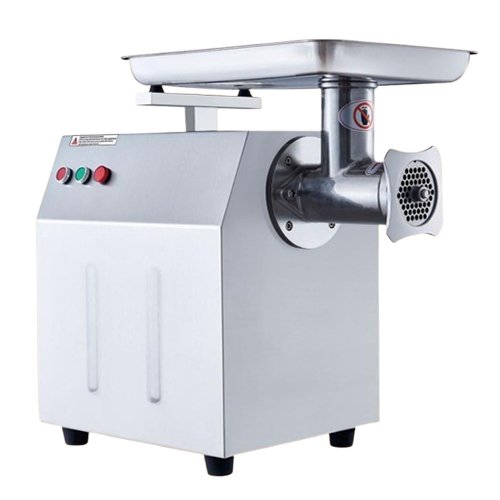
For any restaurant owner, butcher, or food service professional, the quality of ground meat directly impacts customer satisfaction and business reputation. Achieving consistent texture, optimal fat distribution, and maintaining food safety standards requires specialized equipment. This is where a commercial meat grinder becomes indispensable, transforming raw ingredients into perfectly processed meat that meets professional standards.
What is a Commercial Meat Grinder?
A commercial meat grinder is a heavy-duty food processing machine designed specifically for high-volume meat grinding operations in professional kitchens and butcher shops.
How It Works: The machine uses a powerful motor to drive an auger (spiral screw) that pushes meat through a grinding plate with precisely sized holes, creating uniform ground meat texture.
The Key Difference: Unlike residential models, commercial units are built with robust motors, stainless steel construction, and enhanced safety features to handle continuous operation and large quantities.
Here’s a clear comparison with standard home meat grinders:
| Feature | Commercial Meat Grinder | Home Meat Grinder |
|---|---|---|
| Motor Power | High-performance motors for continuous operation | Moderate power for occasional use |
| Construction | Heavy-duty stainless steel, professional-grade | Lighter materials, basic construction |
| Capacity | Large-volume processing capabilities | Small batch processing |
| Safety Features | Advanced safety systems and commercial certifications | Basic safety features |
| Durability | Built for daily, intensive use | Designed for occasional home use |
| Grinding Consistency | Precise, uniform results every time | Variable results depending on usage |
Where Can a Commercial Meat Grinder Be Used?
The robust design and high-capacity capabilities make commercial meat grinders essential across various professional food environments.
• Restaurants & Steakhouses: Perfect for creating custom ground beef blends, specialty burgers, and fresh sausage preparations
• Butcher Shops & Meat Markets: Industry standard for processing large quantities of various meat types with consistent quality
• Delicatessens & Specialty Food Stores: Enables fresh, made-to-order ground meat products and artisan sausage creation
• Catering Operations: Provides the volume capacity needed for large-scale food preparation and event catering
• Food Processing Facilities: Essential for commercial-scale meat processing and product manufacturing
Why Should You Choose a Commercial Meat Grinder?
Investing in a commercial meat grinder delivers measurable benefits that directly impact your operation’s quality and efficiency.
✅ Superior Meat Quality Control: Precise grinding plates and consistent processing ensure optimal texture and fat distribution for premium results
✅ Enhanced Food Safety Standards: Stainless steel construction and easy-clean design support rigorous hygiene protocols and regulatory compliance
✅ Significant Operational Efficiency: High-capacity processing capabilities allow for substantial volume handling in reasonable timeframes
✅ Reliable Performance Consistency: Professional-grade construction ensures dependable operation during peak service periods
✅ Cost-Effective Processing: In-house grinding reduces ingredient costs while providing complete control over meat quality and freshness
How Do You Properly Operate a Commercial Meat Grinder?
Follow these essential steps and best practices for optimal results and equipment longevity.
Step-by-Step Operating Guide:
- Preparation Phase: Ensure all components are properly assembled and the meat is appropriately chilled before processing
- Safety Check: Verify all safety guards are in place and the emergency stop function is accessible
- Processing Operation: Feed meat steadily into the hopper while maintaining consistent pressure without forcing
- Quality Monitoring: Observe the grinding consistency and adjust feed rate as needed for optimal results
Professional Best Practices:
Temperature Control: Keep meat at optimal processing temperature to maintain quality and prevent equipment strain
Regular Maintenance: Clean and sanitize all components thoroughly after each use following food safety protocols
Safety Compliance: Always use the provided pusher tool and never attempt to clear blockages while the machine is running
Load Management: Process appropriate quantities to avoid overloading the motor and ensure consistent results
What Should You Consider When Choosing a Commercial Meat Grinder?
Use this comprehensive checklist to ensure your selection meets your operational requirements.
☐ Processing Capacity: Does the unit handle your required volume during peak operating periods?
☐ Motor Specifications: Is the motor powerful enough for your intended meat types and continuous operation needs?
☐ Construction Quality: Does it feature heavy-duty stainless steel construction suitable for commercial environments?
☐ Safety Certifications: Are appropriate safety features and regulatory compliance certifications included?
☐ Grinding Plate Options: Are multiple plate sizes available for different texture requirements?
☐ Ease of Cleaning: Can all components be easily disassembled for thorough cleaning and sanitization?
☐ Service Support: Is reliable technical support and parts availability provided by the manufacturer?
A commercial meat grinder represents a fundamental investment in your food operation’s quality and efficiency. Its ability to deliver consistent, high-quality ground meat while maintaining food safety standards makes it indispensable for serious food service professionals. By selecting equipment that aligns with your operational needs using the criteria above, you’re making a strategic investment in product excellence and customer satisfaction.
Ready to elevate your meat processing capabilities? Explore our curated selection of professional-grade commercial meat grinders or connect with our equipment specialists to discuss your specific operational requirements.

